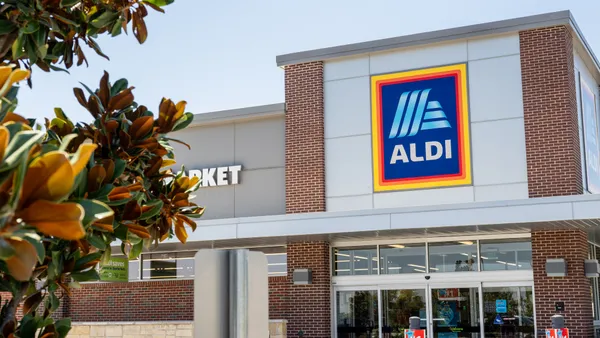Dive Brief:
- Ocado plans to raise about $1.3 billion through the sale of new company shares and a bond offering, the U.K.-based e-grocer and automated fulfillment technology company announced.
- The company said it decided to look for additional funds because it sees an opportunity for growth as the grocers it partners with position themselves to meet rising demand from online grocery customers. Ocado “believes that the COVID-19 pandemic is providing the catalyst for its existing … partners to accelerate their online delivery plans,” the company said in a statement.
- Ocado has concluded that the increase in grocery e-commerce sparked by the pandemic is causing a “permanent redrawing of the landscape of the grocery industry worldwide” and presenting it with a “huge” opportunity to grow its revenue, according to a presentation the company prepared for investors.
Dive Insight:
Ocado is turning to the capital markets for new funding as the pandemic has thrust e-commerce into the spotlight and spurred food retailers to step up their efforts to handle online orders rapidly and efficiently.
The company cited several reasons for wanting more funds. In addition to building capacity for the likely rise in orders from existing customers, the company said it wants to be able to expand the number of partnerships it has with grocers around the world. Ocado also wants to speed up the rate at which it develops the automation technology that is at the heart of its business.
While many grocers depend on human labor to pick and pack groceries for online customers, automation is playing a key role as food retailers retool their e-commerce operations to keep up with demand. On June 5, Kroger, which owns a minority stake in Ocado, disclosed that it will work with the company to build three additional automated fulfillment centers in the United States.
In April, Ocado opened an automated fulfillment center in Ontario, Canada in partnership with Sobeys, its first e-commerce facility to launch in North America.
“As we emerge from this crisis, Ocado has the opportunity to help our … partners in the U.K. and around the world grow faster, to welcome more partners in new markets, to innovate more and more quickly, and to further strengthen our leadership position,” CEO Tim Steiner said in a statement.
Sensing an opportunity, investors have flocked to Ocado, which sells groceries online in addition to providing fulfillment technology for other food retailers. Ocado’s stock price has risen by more than 75% since the beginning of March.
Ocado is far from alone in wanting to capitalize on the robust environment for grocery e-commerce technology. Instacart announced $225 million in new funding on Thursday, while micro-fulfillment companies like Fabric and Takeoff Technologies are touting the benefits of automated fulfillment. The founder of Webvan, the once highflying online grocery company that collapsed in 2001, announced in May that he plans to launch a new automated e-grocer called Home Delivery Service.









